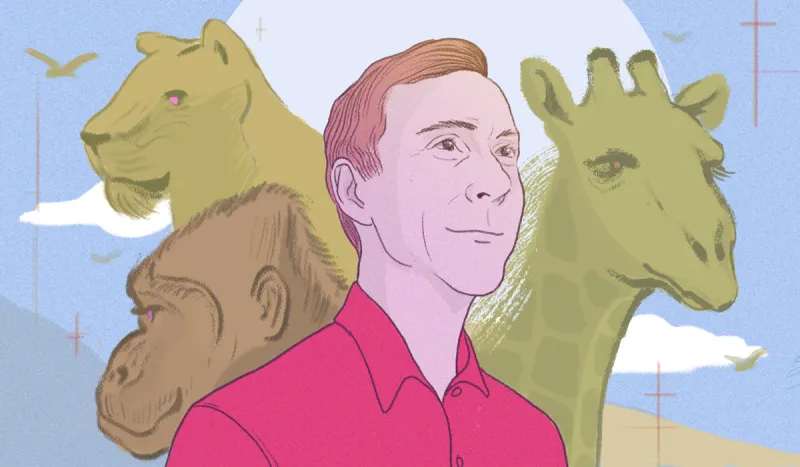
Bill McNabb.
(Illustration by Jeremy Leung / II)
Bill McNabb’s grandchildren think he bought a zoo.
The three boys can be forgiven for thinking he would make such a grand gesture after retiring from his all-consuming leadership at Vanguard Group. During his tenure as CEO from 2008 to 2018, Vanguard’s assets grew almost five-fold. Vanguard became synonymous with passive investing, which in turn became the bane of traditional asset management. McNabb remains chair of Vanguard, and will be spending more time at the Philadelphia Zoo. But as the chair of the zoo’s board, not its owner.
Earlier this year the chair lunched on two homemade peanut butter and jelly sandwiches and chocolate milk. We ate in The Solitude — a house on zoo grounds built in the late 18th century by John Penn, grandson of William Penn — and McNabb sketched out his plans.
McNabb said he had a casual love of animals when he first made the connection to Philadelphia’s nonprofit menagerie. But that has bloomed into a passion for animal behavior, wildlife conservation, and inspiring kids to one day take on issues like extinction.
He joined the zoo’s board in 2006 while running Vanguard’s institutional business. Jack Brennan, then Vanguard’s CEO, asked McNabb what he wanted to get involved in beyond the suburban firm’s walls. The former Latin teacher desired a link to the city of Philadelphia and to kids and education. When he learned the zoo drew 1.2 million visitors a year — second only to the Liberty Bell as a Philadelphia attraction — and saw 30 school buses lined up at its gates, McNabb was sold.
Now he even has a favorite zoo resident.
“Tony the rhinoceros. He’s my guy, my spirit animal,” McNabb said as we walked through the zoo grounds. He recently went on safari in Kenya, spending time at an orphanage for elephants and encountering a cheetah in an off-limits area. “When you see this guy, Tony, a couple of tons of horn and muscle, and you see what is being done to rhino populations around the world, you’re sick,” he said.
When McNabb first joined the board, the zoo’s new CEO began transitioning the zoo from a place for people to come and view animals to a habitat more conducive to an animal’s well-being. This is the sector’s prevailing philosophy now, but was relatively rare at the time. Zoo360, as the initiative is called, includes redesigned trails allowing animals freedom to roam around the zoo’s 42 acres, while still keeping legions of children safe.
McNabb pointed to a walkway for tigers built above the paths, laughing about a poor photographer who tried to get a shot of the zoo’s board beneath the bridge. Neither the 30 board members nor the tigers hovering above their heads were willing to cooperate.
The man who struck fear into active managers hasn’t gone full Jane Goodall. He’s very much interested in using his expertise to help fast-changing industries make money, and recently joined the board of insurance behemoth UnitedHealth Group. He’s looking for more board seats too. And, more than most executives, he has learned firsthand how radically different the corporate director role is than it once was.
Boards once did their work behind the scenes.
Corporate governance — and the role Vanguard played — changed during McNabb’s tenure. Five years ago fund managers didn’t spend much time on the governance of the companies they owned, whether voting proxies or engaging with management, he acknowledged. Even active investors ignored stewardship, because they rapidly turned over their portfolios and weren’t taking the time to research issues companies faced. Many have stepped up, he argued, as Vanguard did.
Yet governance at controversial companies such as gun manufacturers and gun sellers remains tricky, McNabb said. Social activists are frustrated with government inaction when it comes to issues like climate change, so they’re turning to big shareholders to get things done. Activist investors pose a whole separate set of challenges.
“Everyone, whether social activists, political activists, corporate activists, or long-term investors, is asking the same question: 'What is the purpose of the corporation?’ Is it to serve more than just shareholders? What about other stakeholders?” McNabb reflected.
“I would suggest that any company that doesn’t take care of its other stakeholders is not going to be successful in the long run,” he continued. “You can’t attract good people if you aren’t behaving properly or giving back to your communities. That’s what people want. You don’t even have to get into a debate about climate change. If your consumers are asking, 'What are you doing with the environment?’ you don’t have a business if you don’t have a good answer.”
McNabb said Vanguard has been successful in part because it has thought about other stakeholders. Younger people in particular care deeply about their employers’ business ethics. While teaching alongside legendary professor Kenneth French at Dartmouth College’s Tuck School of Business, he met a woman who vowed not to interview with any financial firms for ethical reasons. Then she joined Vanguard. The company passed her test, McNabb said. He also trains Wharton students every fall to be nonprofit board members. “When I was at Wharton, nobody talked about nonprofits.”
Looking back at his tenure as CEO, McNabb said his strategy — including growing target-date funds and financial advice — came from one offsite meeting he held shortly after the financial crisis. Vanguard Personal Advisor Services now has more than $100 billion in assets, and Vanguard’s target-date funds are the largest in the industry. He wanted to do with financial advice what Vanguard had done with stock investing: push the industry to offer lower-cost products.
But it’s hard to know exactly how things will play out, he stressed. That’s true of strategies at asset managers and at zoos. He pointed to a new trail where he often sees different primates running around. “We thought Zoo360 would be a big deal. But we missed just how big.”
The giraffes were hungry.
McNabb had arranged for a special feeding of Stella, Gus, and their teenage daughter, Abbie, who was born at the zoo. “She wants her personal space,” said a zoo behaviorist. I waved plant stalks with their leaves at Stella, who was pregnant at the time. She gave birth in June to Beau and is the brains of the giraffe operation, but lets Gus believe he’s in charge. As Stella munched, Gus not so gently pushed her away from the leaves — a dangerous maneuver with any pregnant female. She’d had enough, he seemed to determine. Giraffes, like their human counterparts, have quirks and personalities.
Asked if he misses being CEO, McNabb said, “It’s time to bring in fresh perspectives. My life was really regimented. I’m just figuring out my new cadence.”




